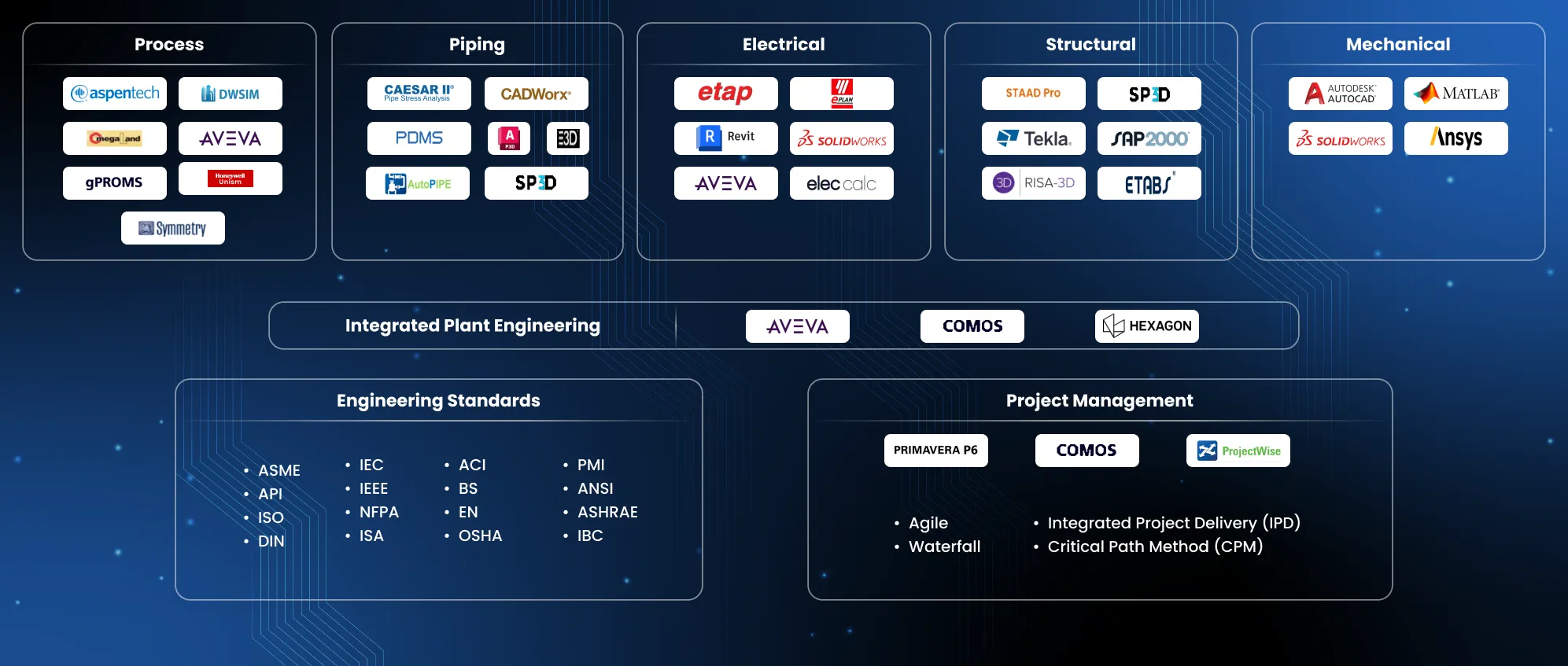Plant Engineering Services
Engineering excellence starts with designs that stand up to real-world construction, operation, and compliance demands. Utthunga’s Plant Engineering Services bring together multidisciplinary expertise, advanced digital modeling, and industry-specific know-how to deliver infrastructure that performs from day one and keeps delivering for decades.
From process units and utility systems to instrumentation, piping, and power distribution, our teams engineer every element to be technically precise, build-ready, and aligned with both operational goals and regulatory codes. Across greenfield, brownfield, and modular projects alike, Utthunga’s plant engineering services turns precise engineering into safe, compliant, and high-performing facilities — ready for you to build with confidence.
Our Plant Engineering Services Spectrum

Engineering Consulting & Studies
We conduct technical and compliance studies that remove uncertainty from project planning.
- Energy performance assessments
- Environmental and emissions analysis
- Reliability assessments
- Safety audits, HAZOP, SIL studies
Design & Engineering
From feasibility to commissioning, our plant engineering services focus on constructability and compliance at every step.
- Pre-FEED and FEED Studies
- Basic and Detailed Design Engineering
- Procurement Support and Vendor Coordination
- Site and Commissioning Support


Multi-Disciplinary Capabilities
Integrated expertise across all core plant engineering disciplines.
- Process Optimization
- Mechanical Systems Design
- Structural Design and Stability
- Smart Instrumentation
- Power Systems Engineering
- Piping and Layout Design

Process & Asset Modeling
Process Optimization

Proven Results
Global Customers
50 +
Industrial Plants Transformed
FEED and Detailed Design Projects Delivered
Industries We Serve
Our Digital Engineering Ecosystem
Advanced tools and proven standards driving precision at every stage of our plant engineering services.

Why Clients Choose Us
Full-Lifecycle Expertise
Proven Cross-Industry Experience
Digital-First Engineering
Risk-Aware Design Philosophy
Vendor-Neutral Integration Capability
Global Delivery Model
Every great plant starts with precision engineering. Let's build yours together!
FAQs
1. What are plant engineering services?
2. Which industries need plant engineering services?
3. What is the difference between plant engineering and industrial engineering?
4. How do plant engineering services help reduce downtime?
5. Do plant engineering services include energy management and efficiency audits?
6. What role do plant engineering services play in safety and compliance?
7. What is plant layout design and why is it important?
8. How is predictive maintenance implemented in a manufacturing plant?
9. What are the most common challenges in plant operations and maintenance?
10. How do plant engineers improve energy efficiency?
11. How can plant engineering services in the USA help optimize operational efficiency and reduce costs?
Plant engineering services for U.S. industries help enhance operational efficiency by implementing predictive maintenance strategies, optimizing energy consumption, and streamlining workflows. These solutions reduce downtime, lower operational costs, and improve overall plant performance.
12. What role do plant engineering companies in the USA play in ensuring compliance with industry standards?
Plant engineering companies across the U.S. ensure compliance with industry standards by designing systems and processes that meet all regulatory requirements. They conduct regular audits, implement quality control measures, and provide staff training to maintain consistent compliance and safety.
13. How do industrial plant engineering services in the USA support sustainability initiatives?
Industrial plant engineering services for U.S. companies support sustainability initiatives by designing energy-efficient systems, reducing waste, and integrating renewable energy solutions. They also conduct environmental impact assessments and recommend practices that help minimize the ecological footprint of plant operations.
14. What are the key considerations when selecting a plant engineering company in the USA for a new project?
When choosing a plant engineering company in the U.S., key factors include proven experience in your specific industry, strong expertise in regulatory compliance, a track record of on-time and on-budget delivery, and a forward-thinking approach to innovation and sustainability.
